
Abstract: This article traces the evolution of MoonPads, a social benefit company founded by the author, weaving a narrative that spans personal experiences, academic pursuits, and a commitment to sustainability, social equity, and menstrual justice. The article explores the interconnected journey from childhood influences, through academic endeavors in sustainability education, to the entrepreneurial realm, shedding light on the intersection of gender equity and environmental sustainability. MoonPads emerged as a response to period poverty, seeking to provide accessible and eco-friendly menstrual products while challenging societal stigmas surrounding menstruation.
Continue Reading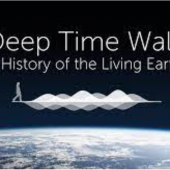
Abstract: At Schumacher College, Dartington, UK in 2008 we introduced the Deep Time Walk – a transformative learning experience in which college participants walk 4.6km in the countryside of the Dartington Estate representing the entire 4,600 million years of our planet’s history. The aim of the walk is to increase the ecological awareness of participants by giving them an embodied experience of the immense age of our Earth. At certain points during the walk a facilitator explains key events in earth history, such as the formation of the planet and the first appearance of living cells. Here we assess the effectiveness of the Deep Time Walk offered to eleven distinct groups of walkers during 2022 -2023. Participants on each of the eleven Deep Time Walks were asked to respond to a simple questionnaire asking them to quantify how much of seven qualities they felt immediately before and immediately after their walk (these were: Awe and Wonder, Sense of Earth’s Ancientness, Connection to Nature, Consequences of the Crisis, Hope, Commitment to Personal Change and Commitment to Political Change) . In total, 153 participants took part in the eleven walks and responded to the questionnaire. Analysis of the data showed a highly statistically significant increase across all seven qualities (p<0.00001 for each quality), suggesting that the Deep Time Walk is an effective means for developing and enhancing ecological awareness and commitment to action in these times of severe global crisis. Qualitative data were not collected during this phase of the study due to time limitations during walks. We recognise the importance of this kind of data and are devising ways of gathering it for both past and future walks.
Continue Reading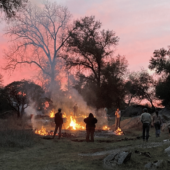
Abstract: The Keepers of the Flame Initiative, now in its fifth year, is a dynamic partnership between cultural fire practitioners, UC Davis faculty, and a diverse study body. This experiential learning initiative at the University of California, Davis centers Indigenous Fire Workshops, focusing on cultural fire. By centering Indigenous science and teaching approaches, this initiative inherently becomes high impact. High Impact Practices (HIPs) are pivotal educational interventions that promote holistic student development and experiential learning. These practices encompass features such as setting appropriately high expectations, experiences with diverse people and circumstances, sustained student engagement over an extended period, meaningful interaction with faculty and peers, public demonstration of learning, real-world relevance of classroom learning, and structured opportunities for reflection. The Keepers of the Flame Initiative incorporates two types of powerful high impact practices: collaborative group projects and community-based learning. These educational practices significantly enrich student learning and particularly benefit historically underserved students as well as broader student populations. I analyze HIP features within the Keepers of the Flame Initiative using survey data gathered in winter 2023, while also delving into the importance of Indigenous-led educational approaches. Indigenous perspectives and educators are crucial in broadening educational approaches, providing a pathway to uphold sovereignty of diverse knowledge systems, and nurturing a sense of responsibility towards land stewardship and environmental justice.
Continue ReadingLink to the JSE Winter 2023 General Issue Table of Contents Editor’s Note: This contributed poem connects with the Councils of All Beings article by Karen Hindhede in this issue. In this circle wide in species and sparkling imaginings In this circle of story-sharing about sharing stories The call goes out rippling through Creatures, Places, […]
Continue Reading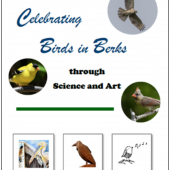
Abstract: Sustainability depends on biological diversity and the investment of individuals and communities in maintaining ecosystems. To engage the public in local biodiversity—specifically birds—we developed a program combining science and the arts. The science involved a group field experience, led by area birders guiding observations and providing information on the birds; the arts produced written reflections and visual representations of the birds and birdwatching. The integration of experiences, as manifested in field notes, artwork, and writing, reinforced understanding of, as well as interest in, birds and their natural habitats. In short, the data confirmed that participants gained a deeper appreciation for the natural world when seeing it in the contexts of both science and creative expression.
Continue Reading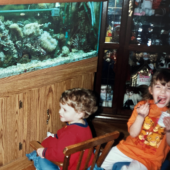
Abstract: Gaining a better understanding of human behavior change is vital to encouraging individuals to adopt an environmentally sustainable lifestyle and to the long-term goal of preserving nature. To explore how life experiences lead to the adoption of environmentally sustainable behaviors, this author turned to autoethnography. Through this reflective method, the author examines their development of environmental identity and their experiences with nature, as they relate to major concepts within the field of conservation psychology, such as ecological literacy, Theory of Planned Behavior, and connection to nature. Leading concepts concerning environmental identity in the conservation psychology literature suggest a very specific pathway for developing environmental identity, and thus pro-environmental behaviors, including experience in nature from a young age, the presence of an environmental mentor, and access to environmental literature. However, the author reveals that there may be other pathways to development of environmental identity, which include virtual environmental mentors (e.g., nature TV show hosts), environmental media (e.g., magazines, documentaries, and internet sources), and other methods of driving emotional connection to nature (e.g., sense of place). Alongside the author, the reader will have the opportunity to consider their environmental experiences and factors influencing their environmental identity, in relation to these major concepts within conservation psychology.
Continue Reading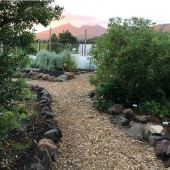
Abstract: Finding love and reciprocity in the garden during challenging times by growing community-based learning experiences.
Continue Reading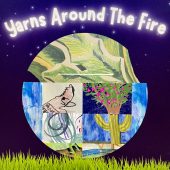
Abstract/Description: What happens when educators and professionals take a long-standing pedagogical activity, The Council of All Beings, and reshape the experience into a picture book? This paper provides a link to the story and relates the storytelling process that occurred with such an adaptation. The paper then explores the benefits of storytelling for young people and considers how co-creating stories can be an antidote to ecophobia while fostering empathy and sparking emotional engagement in the natural world. Finally, the author suggests that co-creating storytelling activities and picture book creations could be used to help children reimagine the world.
Continue Reading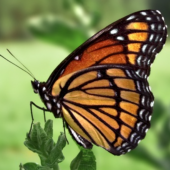
Abstract: This word journey explores flaws in our approach to cultivating environmental ethics and caring for biodiversity, especially among youths, through the lens of Carson McCullers’ classic story about the tragic but common failure of so many to achieve love between human beings.
Continue Reading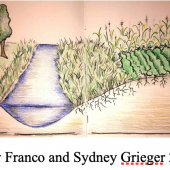
Abstract: This study examined how placemaking curricula shaped teacher candidate (candidate) knowledge, dispositions, and skills to understand, appreciate, and sustain local diversity, as evidenced through candidate reflections and products created in an elementary teacher education course integrating civic science concepts and practices into elementary classrooms. This study explored how placemaking curricula engaged community stakeholders in meaningful shared inquiry on real-world challenges, while meeting state science education standards. Placemaking inquiry projects developed by candidates focused on soil and water conservation, and sustaining diversity in schoolyard spaces. Curricula engaged candidates in learning soil and water conservation techniques from local farmers and conservation leaders, then developing and sharing co-authored civic science children’s books on conservation topics aligned to grade-level standards. As further placemaking curricula, candidates partnered with elementary teachers and students to guide schoolyard observations, designs, and models constructed to sustain diverse abilities, cultures, and ecologies. Presentations to parents and peers celebrated shared insights.
Continue Reading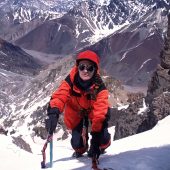
Abstract: Glacial archaeology is an emerging field of scientific research, rapidly expanding in Scandinavia, the Alps and North America. And yet its origins are to be found in the Andes of Argentina. Constanza Ceruti is the first woman high altitude archaeologist in history. Her pioneering contributions to this field of research involve having ascended and explored, sometimes solo and unsupported, more than one hundred peaks above 5000 meters in remote corners of the Andes. In 1999, Ceruti codirected the scientific excavations on mount Llullaillaco (6739 m), the highest archaeological site in the world, and co-discovered three extraordinarily preserved frozen mummies, together with an outstanding collection of artifacts from the Inca civilization (currently housed at the Museum of Mountain Archaeology in Salta, Argentina). In recent years, Ceruti has climbed hundreds of mountains in different parts of our planet, to study (from an anthropological perspective) their role in pilgrimage, folklore, popular devotion, mythology, identity and tourism. Her academic production includes more than one hundred scientific papers and twenty-five books on sacred mountains of the Americas, Europe, Asia, Australia and Polynesia. A northern hemisphere predominance in anthropology at large, and particularly in high mountain and glacial archaeology (associated also with mobbing and male chauvinsm in mountaineering), have led to a lack of proper recognition, not only for her own pioneering career, but for the rightful place of the Andes at the forefront of academic research on the sacred role of mountains in ancient cultures.
Continue Reading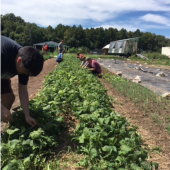
Abstract: This research explores the role that place attachment and place meaning towards an urban farm play in predicting undergraduate students’ civic-mindedness, an important factor in sustainability and social change. In 2017 and 2018, three STEM courses at a private university in the Midwest incorporated a local urban farm as a physical and conceptual context for teaching course content and sustainability concepts. Each course included a four to six-week long place-based experiential learning (PBEL) module aimed at enhancing undergraduate STEM student learning outcomes, particularly place attachment, situated sustainability meaning-making (SSMM), and civic-mindedness. End-of-course place attachment, SSMM, and civic-mindedness survey data were collected from students involved in these courses and combined with institutionally provided demographic information. Place attachment and SSMM surveys, along with the course in which the students participated, were statistically significant predictors of students’ civic-mindedness score.
Continue ReadingAbstract: I was slow in coming to see the desperate need of sustainability education, in part because of a missed opportunity in my field of outdoor adventure education (OAE). Although a burgeoning set of scholars agree that OAE is strategically placed to educate for sustainability, little change within our discipline has occurred. To encourage the transition, this paper has four central aims. First, I contextualize the implications at stake by summarizing recent scientific predictions around climate change. Second, I differentiate sustainable OAE into the sustainability of OAE (e.g., its practices, footprint size, etc.) and OAE for sustainability (e.g., curricula that promotes education about sustainability), noting that despite long-standing petitions to address both, progress has been made in neither. Third, I celebrate, with others, the inherent potential that OAE has to promote sustainability through its educating in natural environs, within living/learning communities, which utilize physical/sensory, affective and intellectual ways of knowing that inspire critical impulses. Fourth, I outline the central changes that need to occur in order to create sustainable OAE. The foremost change needed is for OAE programs to curricularly commit to promoting a sustainability worldview, including values, knowledge, dispositions, and agency related to environmental, social, and economic justice. However, change of this depth will require a revision of OAE course offerings that allow for multiple and prolonged participant engagement over time. Such engagement, then, necessitates that OAE shift its emphasis from remote and sublime landscapes, to programs that not only connect participants to the places in which they reside, but cultivate a care and affection for them. This appreciation can be created through a combination of adventurous learning and microadventures. In sum, “local landscapes, far more often, as a way of life” encapsulate the changes OAE might make in contribution to the global need of sustainability.
Continue Reading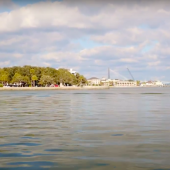
What if a river or a creek were to tell us its story? In this short film and interview, we offer a glimpse into the ecological philosophy guiding our efforts to create “more sustainable ways of living with water and how to appreciate its capacities to support all life.”
Continue ReadingAbstract. This study investigates whether children at an urban place-based environmental education camp can develop three dimensions of eco-character development after week-long participation: Head (knowledge), Hand/Feet (action), and Heart (care/connection). Using a community-based and inquiry-driven curriculum, campers practiced the roles of an arborist, ecologist, and environmental steward. Fifty-five Campers were assessed on all three dimensions using a 10-question pre/post-survey. An overall increase in content knowledge, relationships with nature, and motivation for pro-environmental behaviors were found. Outdoor environmental education summer camps and other out of school experiences may be the new avenue for educators and instructors to consider when trying to promote positive eco-character development in future generations.
Continue ReadingLink to the Ecomedia Literacy Table of Contents Lopez et al. Editorial Overview JSE April 2020 Ecomedia Literacy PDF Forward from JSE Editor-in-Chief, Clare Hintz: The Journal of Sustainability Education marks its tenth anniversary year with an issue on Water Literacy (published in March) and this issue, Ecomedia Literacy. From a dream of several Ph.D. […]
Continue Reading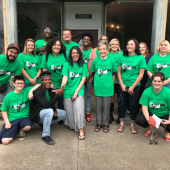
Abstract: In the summer of 2019, the We are All Connected urban-rural youth media program launched Something in Our Water, an eco-media documentary project that investigates the shared problem of water sustainability, public health, and climate change in their communities. This article discusses the transformative experience that the youth from New York City and the Clearfork Valley in the East Tennessee Appalachian mountains had as they learned about the history of multinational coal mine companies’ economic and environmental exploitation of the community, and the fierce and unequal power relations that continue to challenge environmental advocates today. With a focus on the perspectives of one of the Tennessee youth producers, the article reflects on the impact intergenerational learning and multicultural collaboration can have in nurturing future youth and community eco-media activists in Appalachia in the face of deeply rooted local and structural constraints. Through the process of documenting struggles in urban and rural communities, the youth team developed a deeper understanding of how the environmental justice movement cuts across differences to show how everyone is connected and can be empowered to take action.
Continue Reading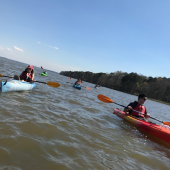
This essay describes a series of interdisciplinary projects addressing environmental issues in Florida where faculty and students from different departments collaborate on complex problems and produce multimedia work aimed at reaching a public audience. Through a series of brief case studies, a model of interdisciplinary experiential education emerges, providing a pathway forward for other faculty to create community engaged projects that have real world impacts.
Continue Reading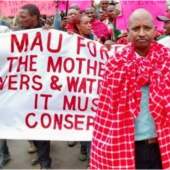
Abstract: This article posits that Maasai Indigenous activists’ call to save Kenya’s Mau Forest Water Tower for its ability to protect downstream water security has emerged as an environmental-policy microcosm illustrative of globally surging interest in such Nature-Based Solutions (NBS). Through an analysis of the Mau Forest issue, a series of United Nations Development Programme case studies, and increasing inclusion of NBS for water at recent global policy events such as the United Nations General Assembly and World Economic Forum, this article suggests that a new water infrastructure policy paradigm appears poised to increase implementation of NBS-informed by Indigenous and Traditional Ecological Knowledge (ITEK). The potential of this paradigm shift is illustrated by the North American Indigenous Mi’kmaq concept of Two-Eyed Seeing, which encourages the synthesis of solutions from both western-emanating Scientific Ecological Knowledge (SEK) and ITEK on a path toward positive social-ecological outcomes.
Continue Reading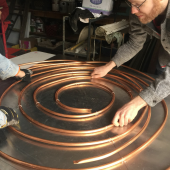
Abstract: Part Two of a two-article series describes water conservation through graywater use and rainwater harvesting. Sustainable methods of heating water for a recirculating shower, and potential methods for water filtration and purification are presented. Also addressed is the feasibility of sustainable showering alternatives. An opportunity for educators and students to collaborate in the development of an off-grid recirculating shower is provided as well.
Continue Reading
Abstract: Part One of a two-part article outlines a brief history of showering and questions current showering practices. Current global levels of water use and availability are discussed, plus water use in the United States, relative to Americans’ frequency of showering. The energy requirements for cities to provide clean water is outlined as well as the carbon dioxide emissions that are subsequently released during water delivery and wastewater disposal. In Part Two, water conservation through graywater use and rainwater harvesting is described, and sustainable methods of heating water are offered. Possible methods for water filtration and purification are presented. The feasibility of alternatives for a more sustainable shower is addressed. Both articles conclude with an invitation to students and instructors to collaborate with the author to construct a prototype of an off-grid recirculating shower.
Continue Reading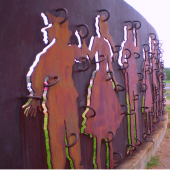
Abstract: In this article, I view Alvarez Armando’s “We the People” sculpture in Gallup, New Mexico, through the lens of Plato’s “Allegory of the Cave” and argue that although the message of the “We the People” art installation is to illustrate democracy and freedom, its staticity may contradict its intent and adds an additional layer to its interpretation. The “We the People” art sculpture invites interaction, but interaction, like in Plato’s “Allegory of the Cave,” is limited in scope and perception. My exploration comes with questions about the meaning of cave dwelling and enlightenment. What is the meaning of “We the People” when equality is not something every citizen can take for granted? Are we then an enlightened society that think we have gained exit from cave dwelling when freedom and a particular interpretation of democracy is not designed for everyone?
Continue Reading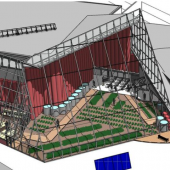
Abstract: The new educational revolution of Educating for Sustainability needs to be taught in a new, revolutionary teaching space; a teaching bioshelter. Drawing on the five ecological principles of the Center for Ecoliteracy, this new teaching space should reflect ecocentric design principles, rather than the previous anthropocentric industrial designs of our current school and college classrooms and campuses. A solar-powered, living classroom, a system of systems, such as a teaching bioshelter, opens new educational horizons by providing continuously available and hands-on learning environments not currently available to the Educating for Sustainability (EfS) curriculum. Fortunately, the architectural and technical design work for these kinds of spaces was pioneered nearly 50 years ago by numerous cutting-edge research groups, such as the New Alchemy Institute. It is suggested that these two ecological flows, of design and education, be joined to enhance and expand the mission of Educating for Sustainability.
Continue Reading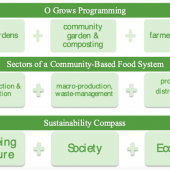
Abstract: This program feature documents our reflections on how the work of O Grows, is, or more accurately has become, increasingly sustainability-oriented. O Grows is a non-profit, community-university partnership with the mission to leverage the local capacity in service of community food needs. Specifically, we focus here on how engagement with an increasing number of sectors of the local food system, as we work toward this mission, has demonstrated a commensurate increase in alignment with the cardinal directions of the sustainability compass—attention to Nature, Society, Economy, and Wellbeing. We have realized, as O Grows has evolved, that keeping the program going and attending to sustainability are one and the same. As such, we argue the sustainability compass is a useful heuristic not only for reflection after-the-fact but also for partnership planning.
Continue Reading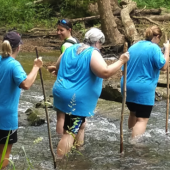
Abstract: The purpose of this article is to provide key aspects and learning outcomes associated with the Math of the Mountains Project. Math of the Mountains was a year long grant project that engaged 60 K12 mathematics teachers in the key concepts and applications of place-based learning and mathematics instruction. Through online coursework and peer support, a four-day immersive field experience, and teacher led field experiences, participants applied elements of PBL to create lesson activities that support real-world learning and problem solving scenarios.
Continue Reading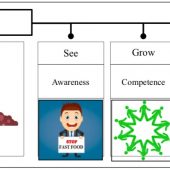
Abstract: The impact of school gardening on nutritional attitudes and behavior regarding purchase and consumption of food is explored with pupils who participated in school gardens. The researchers of the recent study conceptualized a framework of potential factors influencing nutritional behavior based on empirical data with pupils from general and vocational high schools in Vienna. Three hundred and sixteen pupils, aged between 16 to 21, were interviewed in a cross-sectional study. The pupils who participated in school gardening are significantly better informed about sustainability than the pupils who did not. There is a significant difference between pupils who took part in school gardening and those who did not, regarding their self-assessment towards their connection to nature and sustainability. The total consumption of vegetables has increased within the families of participating pupils by 17%. School gardening seems to promote pupils’ reflection on their own diet as well as foster a favorable attitude towards a healthy and sustainable diet. We conclude that the implementation of school gardening has a significant positive impact on pupils’ attitude and behavior towards sustainable diets.
Continue Reading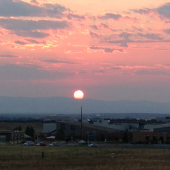
Abstract: This paper describes and explains findings from an exploratory, interpretative qualitative case study that examined how a residential graduate program in science education, based in a wilderness area, supported the development of citizen educators. Data collection over a three-year period included 16 in-depth interviews with administrators, faculty, and graduate students; observations of class activities and campus community meetings; and document analysis of curriculum materials. Analysis of the data revealed how the culture of the campus community encouraged students to become citizen educators.
Continue Reading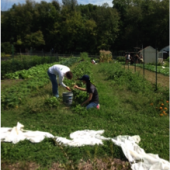
Abstract: Campus agriculture projects are increasingly being recognized as spaces impactful to student engagement and learning through curricular and co-curricular programming; however, most campus farm activities are limited to agriculture or sustainability programs and/or co-curricular student clubs. Thus, campus farms are largely underutilized in the undergraduate curriculum, marking a need to explore the efficacy and impact of engaging a diverse array of disciplinary courses in the rich social, environmental, and civic context of local sustainable agriculture. The Farm Hub program presented here incentivizes instructors to refocus a portion of existing course content around the topic of local, sustainable agriculture, and reduces barriers to using a campus farm as a situated learning context for curricula. A pedagogical framework founded in place-based experiential learning (PBEL) theory was developed to guide instructors in the development and implementation of 4–6-week inquiry-based PBEL modules embedded in existing courses. The framework was converted into a research protocol to quantify program implementation fidelity and PBEL best practice adherence for the proposed lesson plans (intended) and their implementation (applied). The framework enables the development of a cohesive cross-curricular program so that the impact of implementation fidelity and best practice adherence to student learning outcomes in scientific literacy, place attachment and meaning, and civic mindedness can be assessed and the results utilized to develop a formal farm-situated PBEL pedagogical taxonomy. This framework can be applied to PBEL curriculum in natural spaces beyond campus farms.
Continue Reading“The Community Food Forest Handbook: How to Plan, Organize, and Nurture Edible Gathering Places” by Catherine Bukowski and John Munsell is a rare edition to the literatures of permaculture and agroecology: it foregrounds sociocultural dimensions in the context of ecological design.
Continue Reading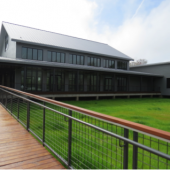
An Urban Nature Center: Take 2. My Journey to Sustainability Education in Rebuilding a Nature Center
Continue Reading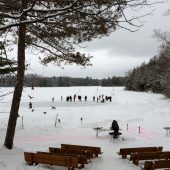
Abstract: In this article, we examine the collaborative efforts of university-employed folklorists with Waaswaaganing Anishinaabe (Lac du Flambeau Ojibwe) teachers and community leaders in what is currently known as northern Wisconsin. Focusing on the Ojibwe Winter Games—an annual weeklong event in February for middle school students that aims to revitalize traditional competitive games—we suggest that decolonizing sustainability education requires recognition that sustainability is pluralistic and culturally specific. Educators must facilitate a restorative systemic shift towards Indigenous sustainabilities through Indigenous-centered pedagogies and methods of knowledge production. In order to accomplish such a shift, our responsibility as academics and public folklorists must always be to the Indigenous communities with whom we work. We explore the role of non-Indigenous collaborators in Indigenous-led decolonization efforts, in developing educational systems that support and sustain Indigenous knowledge systems, and in the repatriation and rematriation of land, language, and culture.
Continue ReadingThe White Kid at the Native American Camp
Continue ReadingAbstract: Decolonization is a multifaceted and complex process, involving a wide range of concepts, including the restoration of Indigenous lands to Indigenous control, improved recognition of tribal sovereignty, strengthening of Indigenous worldviews and knowledge traditions, cultivating cultural responsiveness in education and health care, aligning research methods with Indigenous cultural priorities and values, and more.
This special issue of the Journal of Sustainability Education on the topic of Decolonization and Sustainability Education reflects many of these diverse projects. The issue is inclusive of Indigenous and allied voices, of academic and Indigenous discourses, of large-scale political actions and—what Jeff Corntassel calls—“everyday acts of resurgence.” The selections are arranged in ways that center Indigenous voices and the work on the ground that reinforces Indigenous sustainabilities and Indigenous-centered pedagogies.
Continue ReadingAbstract: Since the 1990s research has been telling us that indigenous students do better in school when they are connected to their cultures. Our experience affirms studies concluding that students who have strong connections to their culture are more resilient and have a stronger sense of efficacy.
Continue Reading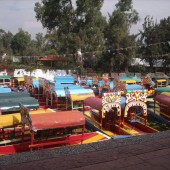
The educational experience described in this article was developed in the course “Social and Cultural Contexts of Teaching” for the Sociology of Education bachelor’s degree at the National Pedagogical University, Mexico. In this course, students are expected to develop favorable attitudes toward the environment. The student’s defined environmental problems made a diagnosis and elaborated a case study, to discuss concrete solutions in their community. The educational experience included several moments: framing, joint planning of individual and group activities, and development of the case study. The balance of the results of the course was favorable; the group learned to work cooperatively, mutual trust prevailed within the teams, group agreements were respected, the group goal was clearly defined, and a case study was delineated and developed.
Continue Reading
La experiencia educativa que se describe en este artículo se desarrolló en el curso “Contextos sociales y culturales de la enseñanza” de la licenciatura de Sociología de la Educación en la Universidad Pedagógica Nacional, México. En este curso, se espera que los estudiantes desarrollen actitudes favorable hacia el medio ambiente; los estudiantes delimitaron problemas ambientales, hicieron un diagnóstico y elaboraron un estudio de caso, para discutir soluciones concretas. Desde el reconocimiento de la crisis ambiental y un problema ambiental específico, los estudiantes desarrollan un estudio de caso de un problema ambiental de su comunidad. La experiencia educativa comprende varios momentos: encuadre, planificación conjunta de actividades individuales, grupales y desarrollo del estudio de caso. El balance de los resultados del curso fue favorable; el grupo aprendió a trabajar de forma cooperativa, prevaleció la confianza mutua dentro de los equipos, se respetaron los acuerdos grupales, se definió claramente el objetivo del grupo y se delineó y desarrolló un estudio de caso.
Continue Reading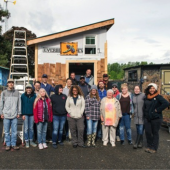
Abstract: Two tiny houses were constructed for the homeless at Dignity Village, Portland, Oregon, by Portland Community College students in two sustainability courses over 6 terms, using different approaches. By engaging the business community at large, various non-profits, parents of the students, and residents of the homeless village, the idea of community-based learning (CBL) was embraced by the instructor. CBL created an environment in which lack of experience and wide cultural variation were transformed into a cooperative community of inspiration.
Continue Reading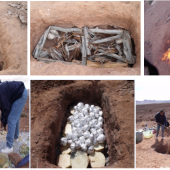
Abstract: For millennia, education for the Hualapai Tribal people was learned through intergenerational lessons taught with the family. This provided younger generations with the skills and knowledge needed to thrive in harsh desert environments. Over the past centuries tribal education has undergone numerous transitions. For the past twelve years the Hualapai Ethnobotany Youth Project has implemented an intergenerational learning program with the elders and youth of the tribal community to instill the centuries old knowledge that could only have been obtained through generations of experience. The program looks to new ways in modern times to teach the old ways in maintaining the continuity of knowledge that only the grandparents can remember.
Continue Reading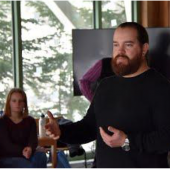
Ojibwe education is used at Conserve School, an environmental semester school, to help high school students better understand diverse perspectives on stewardship and to explore the history, cultures and place of the Northwoods of Wisconsin. In the Environmental Stewardship class, students learn about indigenous history, culture and environmental perspectives from a local Ojibwe forester. The students use this perspective to help them appreciate their place at Conserve School and explore their own environmental ethics. Students also participate in Ojibwe seasonal celebrations to better comprehend how place and people are interrelated.
Continue Reading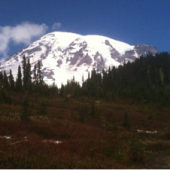
Abstract: In this article, we discuss the importance of Indigenous traditional ecological knowledge as the foundation of sustainability education, and we describe the need for, and successful efforts to, begin building an Indigenous Traditional Ecological Knowledge initiative at a research university. We share the guiding theoretical framework of our work, and the three goals of the initiative. We note the tensions involved in crafting a vision statement that a diverse group of faculty, staff, and students can all uphold in our collective work. We conclude with a description of our next planned steps for the initiative, and our hopes that this work will help decolonize sustainability education.
Continue Reading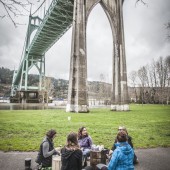
Upstream is an art project that builds connections and circulates stories among people who are linked to teach other through a common watershed. Experiences and memories about water are collected and shared through conversations over tea. Over time, these stories will help build common ground in communities where water can be a divisive issue.
Continue Reading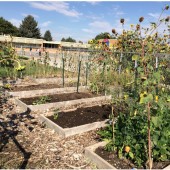
This essay describes a project in which a 4th grade class joined forces with a university class to study and produce as theatre Paul Fleischman’s Seedfolks, an inspiring story of a diverse group of community residents who transform a vacant urban lot into a wonderful community garden. In addition to the arts component, the two teachers unexpectedly found an opportunity to encourage sustainability of education when their students embarked on a pen pal correspondence.
Continue Reading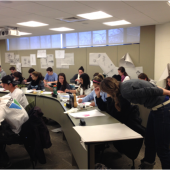
Engaging students not majoring in science, sustainability or environmental studies in learning environmental literacy and shifting their attitudes and behavior toward nature often requires a multi-perspective approach and presents unique challenges. We sought to: (1) pair artistic perspectives with botanical concepts to educate and interest our students in learning environmental literacy, (2) engage our students in careful observation and visualization of nature, and (3) increase the environmental sensitivity of our students by connecting botany with nature based art. To do this we designed a pre-class assignment, an in-class botanical art workshop, and a written reflection assignment that asked students to view, conceptualize, and create works of botanical art as a multi-perspectival process of engaging with relevant scientific processes and environmental concerns connected to botany. Here we provide a justification for the value of bridging science with art, detail our approach, describe student survey responses and thoughtful written reflections, and illustrate lessons learned and future plans.
Continue Reading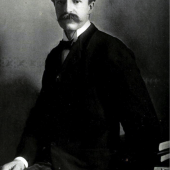
Some scholars of leadership for sustainability argue that more research needs to be done on the ‘who’ of leaders, the core drivers of the ‘what’ and ‘how’ of their decisions and actions. This paper looks at a leading US figure in sustainability, Gifford Pinchot, who led the establishment of the US Forest Service, and who devoted much of his career to conserving the natural world for the good of his fellow citizens. It describes the formation of the ‘who’ of Pinchot as an adult leader through a focus on his early learning environment in order to point to some essential and timeless principles for the education of leaders of sustainability.
Continue Reading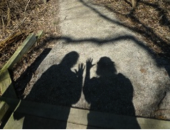
This article focuses on ‘Hope and a Hike’ a women’s walking group in Ann Arbor, Michigan. The group uses an online Meetup to bring women together for weekly one-hour hikes which include information about a local positive conservation initiative (the hope component). It combines exercise, health gains, and social opportunity, with knowledge, positive local conservation success stories and experience in forested areas. The goal is to awaken a connection to the natural environment with hope and a desire to care and take action for the environment. Participants are women, mostly ages 35-70. This case example includes how the group relates to research on: benefits of walking in nature, awe, women, hope, connection to nature, pro-environmental actions and relational activism. Details about hope topics and ideas for expanding the hikes could be used in informal education as well as in course development.
Continue Reading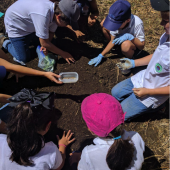
This article describes a sustainable agriculture workshop designed and led by Master’s students to support university-community engagement in Costa Rica. Our project had three transformative goals: 1) to empower Master’s students as educators, 2) to share food security knowledge with community youth, and 3) to strengthen our university-community relationships for knowledge dissemination. For other scholars who wish to apply principles from our Master’s student-led workshop within their local context, we describe our recommendations as well as areas for improvement regarding our three goals. Despite our workshop successes, it was a volunteer project that competed with the academic workloads of the students and the professor. We suggest that community engagement form part of regular academic obligations and courses to increase its accessibility and to provide more opportunities for Master’s students to transition into educators and practitioners before entering their fields of work.
Continue Reading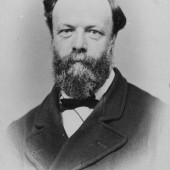
Abstract Innovation for sustainable environments is typically thought of as synonymous with the scientific and the future. This paper argues that historical stories about innovation to create sustainable communities in the past has a contribution to make to research and teaching in the field. It outlines the innovation of forestry in Australia in the nineteenth century, and the thought leadership of the prominent public servant who realized it. It argues that, together with science, students of sustainable environments need to learn to think holistically, framed first by an ethical vision of what a sustainable civil society looks like.
Continue Reading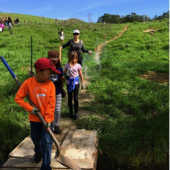
Future casting for us begins with going back — to the real basics, to understanding our place and the people who sustained themselves here for hundreds of years, engaging in real-world problem solving in pursuit of “the right kind of change at the right time.”
Continue Reading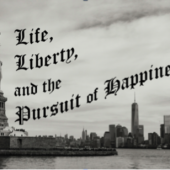
Life, Liberty and the Pursuit of Happiness: Reframing our Goals for Education
Continue Reading